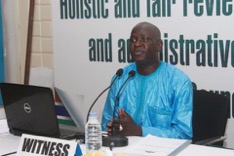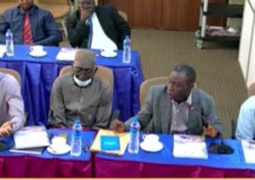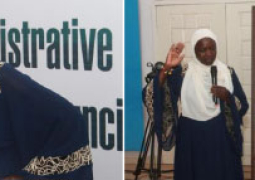
His admissions included a number of lapses and serious operational and administrative issues that have rigged the Brikama Area Council.
Jeng provided to the Commission the 2022 Asset Register of Brikama Area Council. However, reacting to that, the Commission’s supremo, Chairperson Jainaba Bah, raised: “Items 1 to 528 are all tables and chairs.”
Chairperson Bah asked the witness about other assets of the council which were not captured. The witness, Alagie Jeng, was asked to bring the asset registers of BAC but he brought only one. That was the 2022 asset register.
The witness was asked about the documents he was instructed to bring during a previous hearing session. Before the Commission, he tendered his offer of appointment, dated 14 May 2003, by the Kanifing Municipal Council (KMC); letter of appointment, dated 15 July 1999; a confirmation letter, dated 14 May 2003; loans the council took from the banks and financial institutions. They were all admitted in evidence.
According to the available documents, a one million dalasis overdraft from First International Bank on 30 November 2020 was incurred. Also, on the 1st of July 2022, Eco Bank wrote to the BAC offering them a loan of over 3.3 million dalasis; on the 30th October 2022, Trust Bank wrote to the BAC offering them 4 million dalasis loan; on the 29th of June 2022, BAC wrote for a soft loan of over 2.2 million dalasis; on the 12th July 2021, Reliance Financial Service wrote to the Brikama Area Council offering them a 2.2 million dalasis.
Jeng provided the payroll register of BAC and two letters, dated 2nd of March 2022, with a title closure of accounts addressed to Eco Bank and Zenith Bank. The area council wanted their accounts closed with those banks. The witness said the banks received the letters, but the accounts were not closed.
The witness said the only book he maintained as the director of finance was the main cash book. The Commission highlighted that the bookkeeping system of the council was not in line with the provisions of the Financial Manual.
“What are the books that you are supposed to keep as a requirement of the Financial Manual?” Lead Counsel Gomez asked.
Finance Director Jeng said he only maintained the main cash book. He was asked about the monthly and the quarterly reports. He said he used to prepare both. As such, he was ordered to provide them to the Commission. He was also ordered to provide bank reconciliation reports that he claimed to have prepared.
Moreover, the audit report indicated that there were no indications that bank reconciliations and reviews were carried out, and that the few that were performed were erroneous. The management response to the audit query was that they did not have a disagreement with the audit finding, adding that the council will ensure the finance director does bank reconciliations.
Thus, the witness’s testimony proved inconsistent with the management response, in which he participated in writing to the auditors. The witness testified that he found it difficult to trace monies collected by revenue collectors, which were not deposited in the bank.
Lead Counsel Patrick Gomez informed Jeng that the purpose of bank reconciliation is to ensure transactions not recorded by the banks become traceable. He said that is what is contained in the Financial Manual, so that every butut received or collected and deposited will be accounted for.
Jeng was probed on the inconsistencies that the Commission noted in the amounts recorded in the receipts against the collections and the deposits. He responded that he could not ascertain the amounts in the receipts.
“The statements and the reports you wrote are not a true reflection of what obtains in the field,” the chairperson articulated.
Jeng admitted. He also admitted later that they did not have procurement plans for 2020 and 2021.
Furthermore, he was questioned about revenue suppression by revenue collectors and whether he took actions towards addressing such. These suppressions were captured in audit reports by the internal audit unit of the council and the National Audit Office. Jeng also affirmed that instances of revenue suppression happened.
On authorisations he made for revenue collectors to expend from the moneys collected before depositing them at the bank, he admitted that he authorised such expenditures, justifying that they were mainly expended on ceremonies like funerals. He was asked to provide evidence.
He remained adamant that the revenues expended based on his instructions were accounted for. He was instructed to provide the evidence and the details. Quizzed whether the monies suppressed were recovered, he could not provide an answer.





